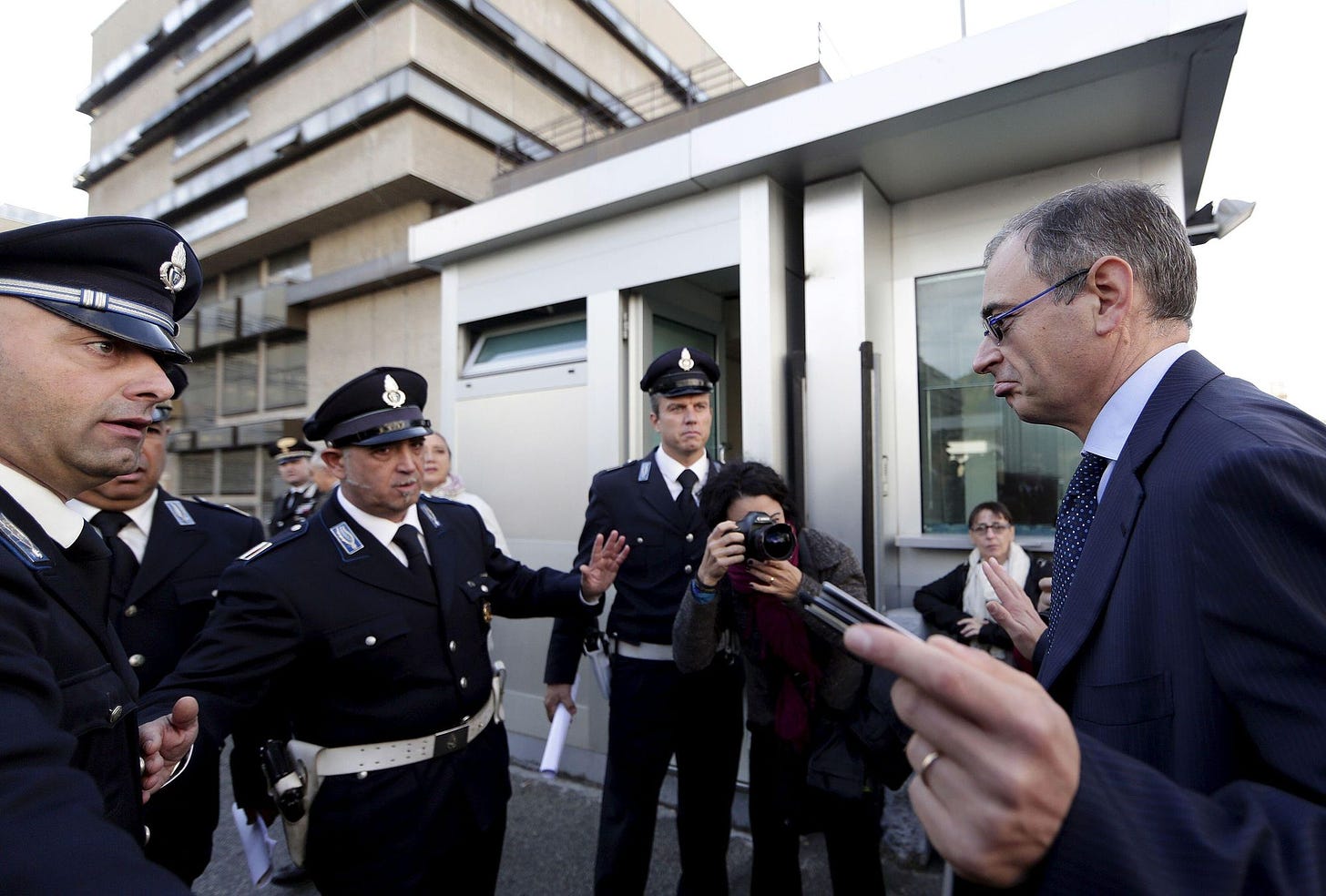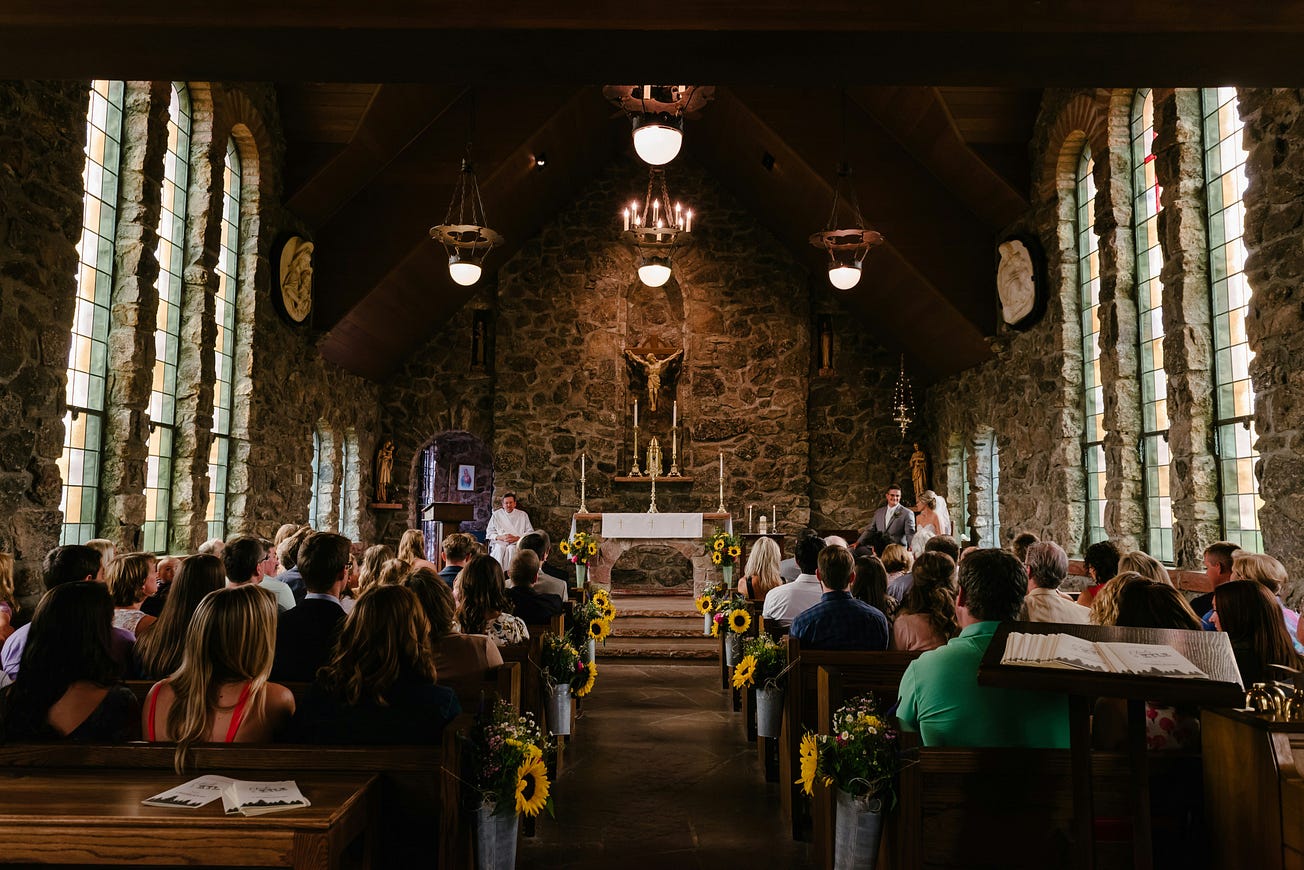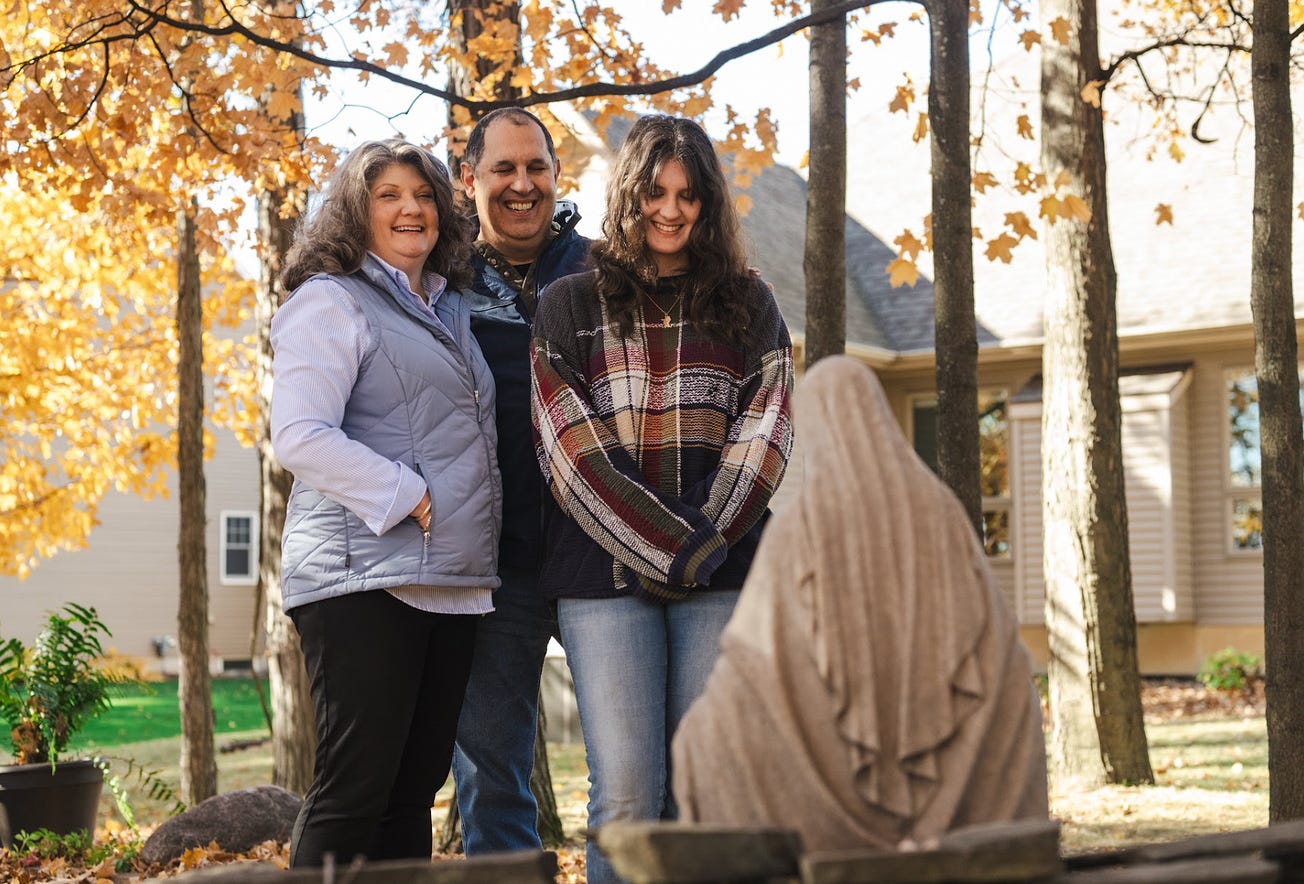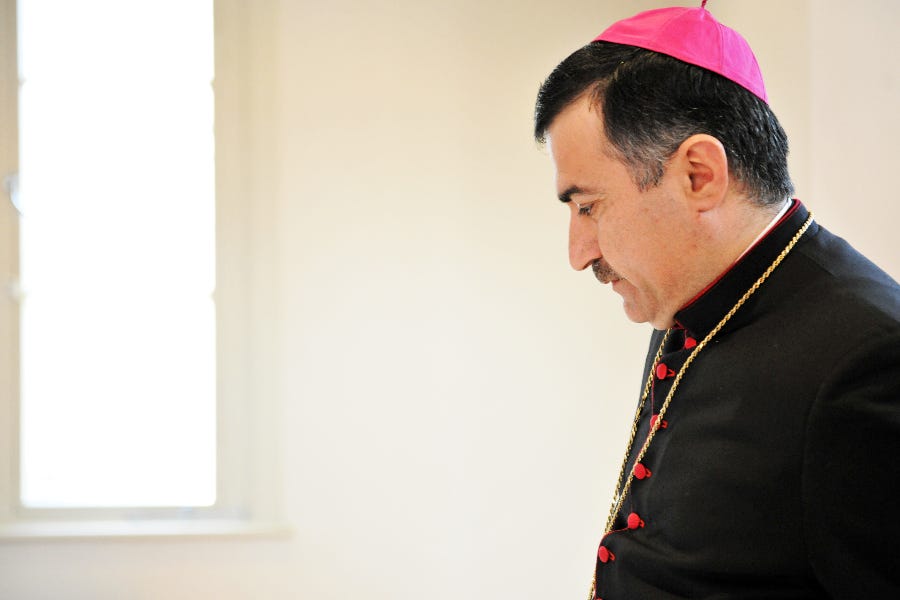
The Holy See press office announced on Friday the retirement of the Vatican’s chief public prosecutor, and the promotion of his deputy to replace him.
The change at the top of Vatican City’s Office of the Promoter of Justice comes as a landmark financial crimes trial is set to resume, and could signal a doubling-down on the prosecution of key defendants, including Cardinal Angelo Becciu.
Gian Pierro Milano, 74, has headed the prosecutor’s office for the Vatican city state since 2013, which secured several major convictions under his tenure — including the recent jailing of the former president of the Institute for Works of Religion, a Vatican bank.
At the same time as Milano’s retirement was announced, the Holy See also announced the promotion of his deputy, Alessandro Diddi to take his place.
Diddi has been in the Promoter of Justice’s office since 2015. His promotion comes as the Vatican City court prepares to kick off the second year of hearings in the trial over alleged financial crimes in and around the Secretariat of State.
That trial has drawn international media attention, and sparked lawsuits and legal processes in several other countries. It has also drawn attention to Diddi, who has led the investigation and prosecution of the ten defendants, which include former senior Vatican officials, as well as a list of wealthy businessmen and investment managers.
Diddi has, at times, faced criticism for how he has conducted both the initial criminal investigation into possible financial crimes, and the prosecution of the case since last July. And he has also become well-known for his bullish courtroom style and his combative exchanges both with defendants and witnesses. While his promotion to first chair in the promoter’s office may be a case of “next man in line,” it is also an implicit endorsement of his work on the case so far — even if only a passive one.
While Diddi’s promotion is likely to rile more than a few of the people involved in the case, his elevation to the top job could represent a renewed commitment to securing convictions in the case.
—
Pope Francis authorized in 2019 an investigation into the Secretariat of State’s London property deal, which saw the secretariat acquire in 2018 a building at 60 Sloane Ave. for a total of nearly 350 million euros.
The pope ordered the probe after the director and president of the IOR- a Vatican bank - raised directly with him their concerns about a loan application from the Secretariat of State to finance the London deal.
Their concern? The secretariat’s leadership, Cardinal Pietro Parolin and Archbishop Edgar Peña Parra, had applied pressure to the IOR to approve the loan despite red flags raised by the mortgage application. The bank initially brought concerns to the Vatican’s internal financial watchdog, the Supervisory and Financial Information Authority. But ASIF officials declined to intervene in the deal, saying it was outside their jurisdiction — and so the IOR administrators went to the pope personally, to ask for his intervention.
Francis authorized the bank to work directly with Diddi to investigate the London deal, along with connected financial dealings at the secretariat and ASIF — the pope made that arrangement because the ordinary reporting mechanisms ran through the individuals and institutions under investigation.
There followed during 2019 a series of high-profile raids on the offices of both ASIF and the secretariat. In the case of ASIF, the raids resulted in the body being suspended from the Egmont Group, the international financial watchdogs’ cooperative, which complained that the raids violated the confidentiality of their information sharing.
Diddi and his team took considerable criticism at the time — they were accused of behaving like bulls in a China shop, with scant regard for the consequences of their actions. They were also lambasted in sections of the Roman press for looking into, and eventually charging, the ASIF’s director and president, both of whom had reputations as champions of financial reform, and both of whom left their offices as a result of the raids.
But as the trial has unfolded over the last 14 months, Diddi’s suspicion of the ASIF leadership has been largely vindicated and, even if the charges brought against its former leaders are still being contested in court, the decision to include accusations of abuse of office within the investigation and indictment now seems justified.
Similarly, Diddi and his team were frequently criticized in sections of the Roman media as they served search warrants on suspects in the case with the aid of Italian court orders and police. In some cases, they had to hand back items — including, in one case, hundreds of thousands of euros in cash and gold coins — taken in the course of the searches but not specifically covered by the warrants.
Some defendants complained in Vatican court (through their lawyers) that they had not been given the chance to explain their part in the Secretariat of State’s financial affairs during the investigation, and that charges had been filed against them without their being given an opportunity to defend themselves.
While prosecutors argued they had made every good faith effort to meet with the defendants and take their statements, and that they’d been effectively stonewalled or given the run-around by defense lawyers, when the judges decided in October last year to ordered Diddi’s team to reopen the investigative phase of the process on more than half of the charges they filed, it was taken by many court watchers as proof that the investigation was a shambles, and the prosecutors were out of their depth.
However, Diddi again appeared to be vindicated when, in January of this year, his team refiled all of the charges they’d been told to re-investigate, with a single exception, and the court dismissed more than 20 pretrial motions brought by defense lawyers asking for the prosecution case to be thrown out.
—
If Diddi’s investigation has been fraught with challenges — logistical and legal — his tendency to win over procedural objections in court is worth comment.
Supporters of the defendants in the Vatican finance trial argue often that there is, in effect, no justice in the Vatican, and that the whole judicial system is some kind of capricious papal star chamber. In some cases, defendants’ lawyers have tried to argue as much in other jurisdictions, including Italy and Switzerland.
And even as foreign courts have ruled in favor of the credibility of the Vatican’s legal system, the judges in Vatican City don’t appear disposed to give Diddi much slack in his handling of the case — on the contrary.
One person unlikely to be toasting Diddi’s recent promotion is Giuseppe Pignatone, the chief judge in the current financial trial. While they are judge and prosecutor in the current case in the Vatican, the two Italian legal veterans have a long and fractious relationship dating back years, with Pignatone acting as prosecutor in a landmark mafia corruption trial in which Diddi was the lawyer for a major alleged organized crime figure.
The rivalry between the two men is well known to be both acute and personal, with Pignatone having won several major convictions in Italian court subsequently diluted on appeal by Diddi. While there is no suggestion the friction between the two men has unduly influenced proceedings in the Vatican, the portrayal of the trial as a kind of cozy stitch-up for the prosecution is simply unsupportable.
While some trial-watchers may have different theories about which legal tactics would serve the prosecution best, there seems little doubt that Diddi’s courtroom victories thus far have been fairly, even hard won.
—
—
But Diddi has also come under fire for his combative style, as much as for the substance of his handling of the prosecution thus far.
In leaked footage of depositions given by the prosecution’s star witness, former Secretariat of State financial official Msgr. Alberto Perlasca, Diddi can be heard aggressively contradicting Perlasca’s account of conversations with Pope Francis about the London deal, with some saying Diddi was badgering Perlasca into changing his story.
The heated exchanges led to demands in the press that Pope Francis give evidence in the trial, amid speculation that the pope had given secret briefings to Diddi’s team.
While those calls have proven legally impossible — as the sovereign head of the Vatican’s judiciary, Francis cannot appear as a witness in a case being conducted under his authority and in his name — criticism of Diddi’s temperament has stuck. And his interventions on the Perlasca tapes have colored public perception of the evidence, even if Perlsaca himself has not complained about his treatment by Diddi, nor called into question how what he told him has been presented in court.
But Diddi’s combustible courtroom style has also delivered some of the trial’s most memorable moments to date.
In his early appearances before the court, the trial’s star defendant, former sostituto Cardinal Angelo Becciu appeared supremely confident as he insisted there was nothing suspicious about his having arranged the transfer of hundreds of thousands of euros of Church funds into personal bank accounts of family members.
Becciu was sacked from the curia by Pope Francis and stripped of his rights as a cardinal in September, 2020, reportedly after the pope was presented with Diddi’s preliminary findings about the cardinal.
But stressing his personal loyalty to Francis, Becciu confidently assured the court in March that there was a reasonable explanation for every financial deal he signed off on while working as sostituto between 2011 and 2018, shortly before the London deal blew up.
That calm appeared to have evaporated in later appearances.
During a session in May, Becciu faced direct questioning by Diddi in exchanges that grew so heated and acrimonious they left the cardinal thumping the table in outrage as Diddi suggested the prelate had remarkably selective amnesia when presented with dozens of financial authorizations bearing his signature and private messages sent by him.
Eventually, Pignatone had to call recesses to allow both the cardinal and the prosecutor to calm down.
While his exchanges with Becciu may have lacked the seraphic calm preferred in the Vatican courtroom, they did appear to force Becciu into trying to blame Pope Francis for many of his own decisions in office.
In addition to blaming the pope and what Diddi called an extremely selective memory, Becciu was also forced to try to present himself as out of his depth in his former job — a hard argument to sell given his years in post and fearsome reputation for effectiveness.
While Diddi’s courtroom combativeness has drawn criticism, it may also be highly effective.
At one point in court, Becciu tried to explain that text messages in which he advised that Gianluigi Torzi (accused of extorting the Vatican for millions of euros) not attend a Vatican meeting at which he was subsequently arrested was just “informal” advice.
Diddi’s obvious incredulity at the cardinal’s account may not have conformed to the Vatican concept of bella figura, but it did serve to underline the disparity between what Becciu was asking the judges to believe and the evidence in front of them.
—
When Pope Francis moved to invite Becciu to attend the consistory of the College of Cardinals a few weeks ago, many — most notably the cardinal himself — predicted that Francis was about to rehabilitate him altogether and restore his cardinalatial rights.
Although the official Vatican list of the college still has Becciu as ineligible to vote in a future conclave, he did appear in public alongside the other cardinals for the first time since his sacking by the pope.
Many interpreted this as a clear, if non-verbal, message of support for Becciu by Francis. Some Vatican-watchers speculated that Becciu’s legal tactic of tying his own controversial actions to the pope personally could have shifted papal support away from the prosecution and towards a softer line for the former papal chief of staff.
It was, others pointed out at the time, equally possible that Francis was just making another gesture of personal solidarity with an old friend in trouble without the intention of signaling anything to the court.
While Francis’ true mind and motivation for inviting Becciu back into the public eye are still unclear, Diddi’s promotion means it is now hard to credit that the pope is actively looking to soften the prosecution of his former chief of staff.
While the court is still considering a potential witness list of hundreds as it prepares to resume hearings, there is no telling when the case might come to a close — or what the judges might rule.
What does seem clear is that under Diddi’s leadership, the prosecution will not be backing off any time soon.



